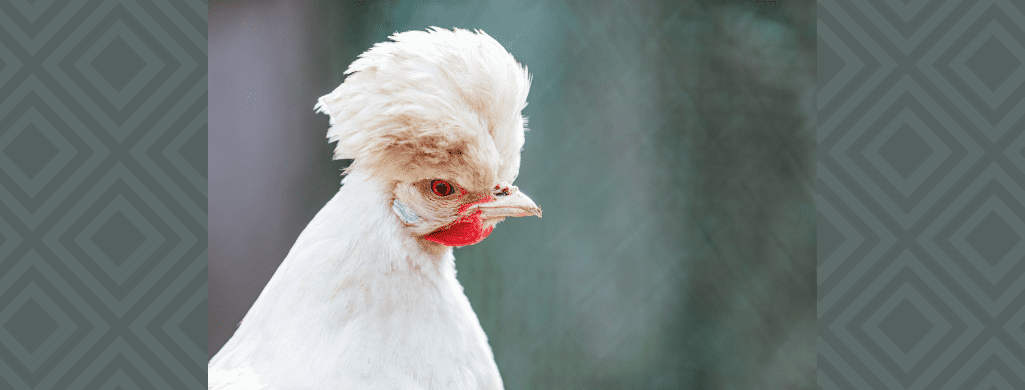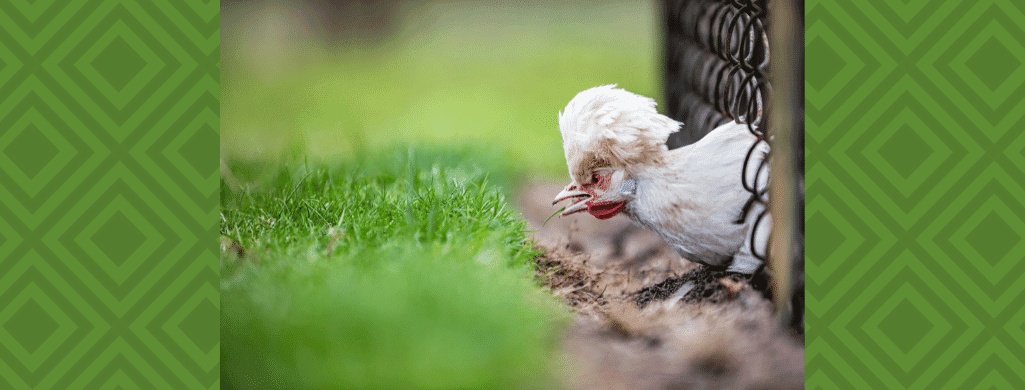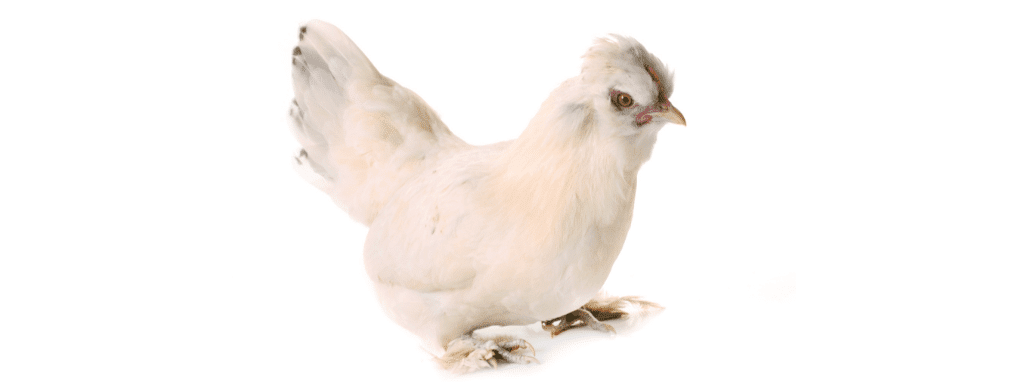If you are lucky enough to own the rare Sultan chicken, you want to feed your pet well.
But when you get one, you’ll need to ensure they’re eating the right things.
Sultan chickens eat regular layer feed with 16% protein, this feed provides all of the essential nutrients your chicken will need. They are great pet chickens, so treats such as fruits and vegetables are welcome. Although they enjoy foraging, they are not the best for free-range chicken.
Read on to learn more about what Sultan chickens eat.

Table of Contents
ToggleWhat Should You Feed A Sultan Chicken?
This breed of chicken originated from Turkey as a popular pet for the royals. This bird is a small and beautifully feathered chicken.
It has a petite body full of white, lush feathers, a large tail, a long beard, and puffy crest feathers. Hens weigh between 3-4 pounds, while cockerels weigh about 4-5 pounds.
This lovable chicken breed is more of a pet than a worker. Although Sultans are meant for egg production, they don’t lay or brood very well.
They are too small to be meat birds. Instead, the best place for these calm birds is in the home as a pet chicken or ornamental bird.
Yet, as with other chickens, Sultans need a balanced, quality-ingredient daily feed. Commercially produced layer feeds can provide a balanced diet for chickens.
Age
Sultan baby chickens need to be fed more often than adults. They should have a starter feed until they are at least 8 weeks old.
Starter feeds are smaller and easier to chew and digest for these baby birds. There is a higher protein content (22%) in starter feeds.
This aids in immune health and tissue growth.
From 8 weeks on, switch them over to chicken pellets, grains, or chicken mash.
Check your layer feed labels. You may want to opt for an organic, whole-grain layer feed such as Scratch and Peck Feed’s Organic Layer Mash.
This has high-quality ingredients to promote a healthy chicken.
Proteins
Proteins are essential to chicken growth. Sultan chickens need extra protein when they molt. They have a lot of feathers to maintain.
In commercial foods, grains such as soybean and corn gluten usually provide the bulk of the proteins. Typical layer feeds contain about 16% protein.

Carbohydrates
Carbohydrates provide energy. Many grains, such as barley, rye, wheat, corn, and millet, are the main carbs in chicken feeds.
Whole grains are better for chickens than cracked corn. Many parts of the grain are indigestible, so too many grains in a diet are bad for a chicken.
Sultan chickens are an ornamental breed needing plenty of energy to grow their ornate feathers, so carbs are important in keeping their feathers healthy.
Fats
Fats are essential in creating cell membranes and hormones. These usually come from vegetable oils in commercial feeds.
Some vegetable oils, such as palm oil, are toxic to chickens in large amounts, so read labels carefully. If your Sultan consumes quality fats, it improves their eggs’ taste and overall health.
Vitamins and minerals
Vitamins and minerals are responsible for various bodily functions, including sight and immune health.
For example, Calcium develops strong egg shells and is largely responsible for a consistent supply of eggs.
It’s also great for strengthening bones. And folic acid is responsible for feather growth.
Sultans do not tolerate cold temperatures well, which can stress their bodies. Vitamins and minerals can counteract the effects of stress.
Water
Water should be provided daily. You Sultan chicken does best in warmer climates. In these conditions, your beautiful bird will need cool water.
However, their feathers often dip into their water dish, causing them to get damp, which may be bad for their health.
Many chicken keepers opt to keep a drip waterer full of fresh water daily instead of a water dish.

What Are Good Snacks For Sultan Chickens?
Sultans love table foods. They enjoy fruits like bananas, apples, and melons. Remove any seeds from the cores of fruits, as they may be toxic.
Also, avoid giving your pet chicken citrus fruits. Citrus is high in sugar content, which is bad for your pet.
Vegetables are also good options for Sultans. They like bell peppers, zucchini, broccoli, and many other vegetables.
Avoid any of the plants from the nightshade family (potatoes, tomatoes, etc.), as these could make your pet sick.
Give your Sultan pasta, cores, peels, and even some dairy. Limit their table scraps, and cut them up into small pieces to keep them from choking and becoming obese.
What Are Good Supplements For Sultan Chickens?
Grit aids with digestion. These indigestible materials move things along in the digestive tract.
In the wild, chickens consume pebbles. In commercial grits, crushed granite is the main ingredient.
Sultans love to forage, but they are not always good at being left alone due to their small size. So, grit maintains their digestive system without having them free range.
How Much Foraging Should a Sultan Chicken Do?
In warmer climates, Sultans will happily forage outside all year long. They should be fed their regular feed first thing in the morning.
Then, they can spend the rest of the day gathering insects for additional protein.
However, they do need to be supervised. Sultans are small and flighty. They can jump small fences and can get into mischief.
They are not very good at defending themselves against predators. So, they cannot free range on their own and are not the best choice for backyard chicken keeping.
Their feathers also tend to get in the way of their productivity, so for all their efforts, they don’t get much out of their foraging.
Free-ranging also increases the risks of the Sultan getting their dirty feathers, which may be problematic since their feathers are so delicate.
They do well in confinement and do not need to forage to survive. They don’t need a large yard. They are adaptable, lovable house birds.
How useful was this post?
Click on a star to rate it!
We are sorry that this post was not useful for you!
Let us improve this post!
Tell us how we can improve this post?
